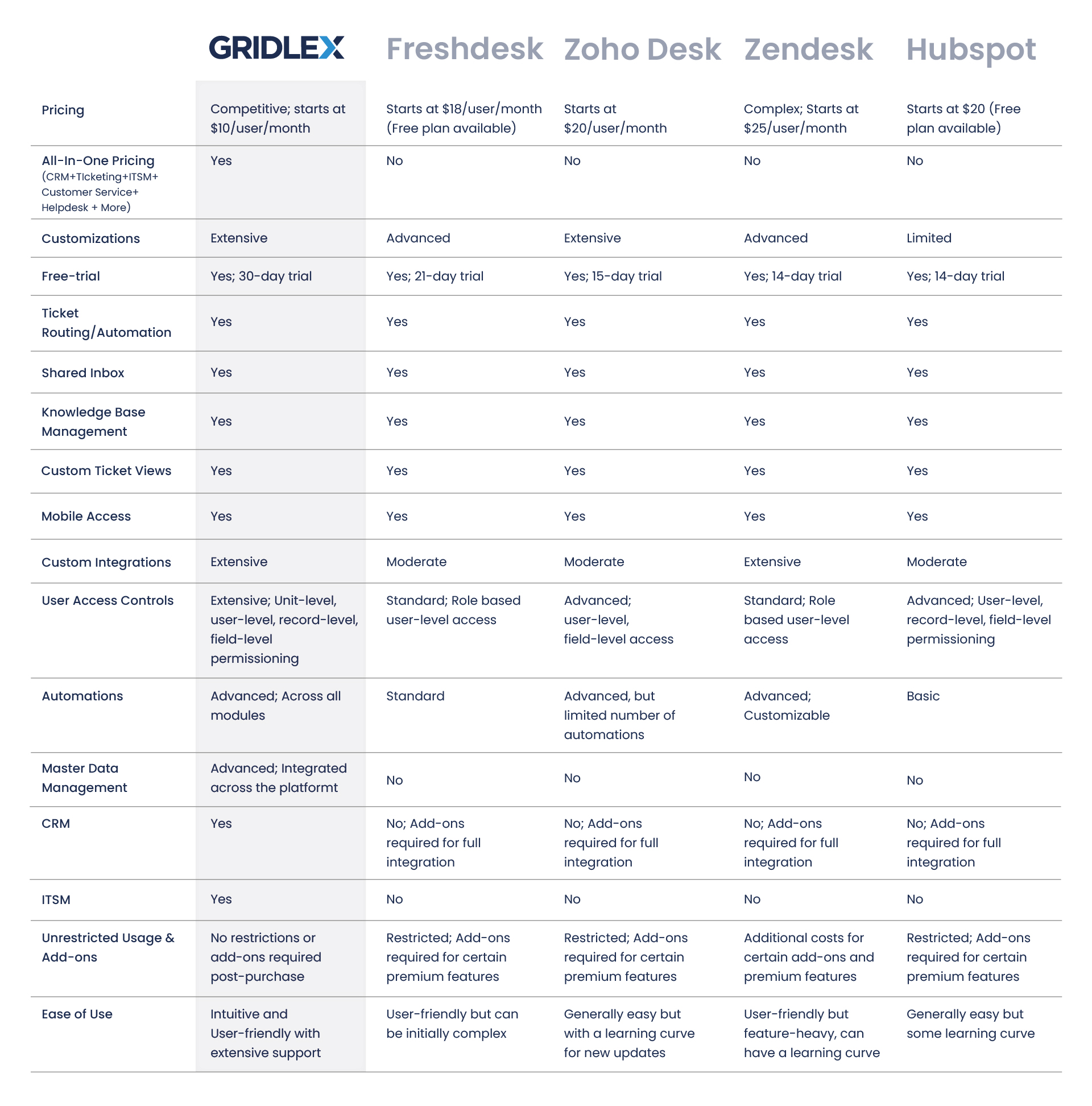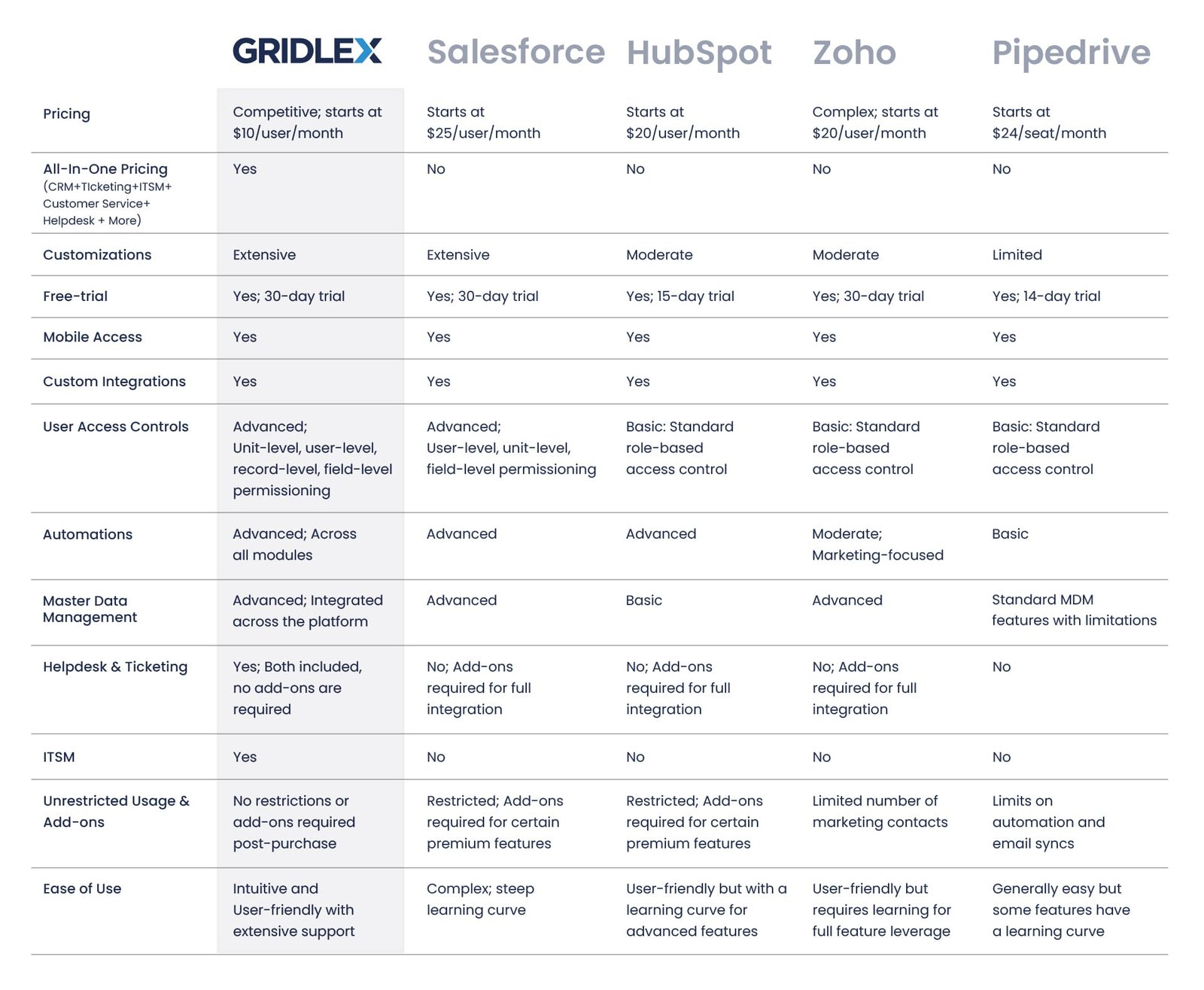Advanced CRM platforms streamline customer interactions and automate tasks. They enhance sales and improve customer satisfaction.
Customer Relationship Management (CRM) platforms are essential tools for businesses. They help manage customer data, automate marketing, and improve service. Advanced CRM systems offer more features like AI-driven analytics and integration with other software. These platforms can predict customer behavior and personalize interactions.
With an advanced CRM, businesses can optimize their operations and boost sales. They are crucial for building strong customer relationships and driving growth. Investing in an advanced CRM system is a smart move for any business looking to scale.
Introduction To Advanced Crm Platforms
Advanced CRM platforms are changing the business landscape. These tools help manage customer relationships. They offer numerous features that enhance sales and marketing efforts. Understanding these platforms can give your business a competitive edge. This section covers the basics of CRM and its evolution.
What Is A Crm?
CRM stands for Customer Relationship Management. It is a tool used by businesses to manage interactions with customers. A CRM system helps in organizing customer information. It tracks sales, marketing, and customer service activities.
CRM platforms have several key features:
- Contact Management
- Sales Management
- Workflow Automation
- Reporting and Analytics
Using a CRM system can improve customer satisfaction. It helps businesses understand their customers better. With a CRM, businesses can personalize their marketing efforts. This leads to higher customer retention and increased sales.
Evolution Of Crm Platforms
CRM platforms have evolved over the years. Initially, they were simple contact management systems. Early CRM systems focused on storing customer information.
Over time, CRM systems added more features. They began to include sales tracking and marketing automation. These features helped businesses streamline their processes.
Today, advanced CRM platforms offer artificial intelligence and machine learning. These technologies provide deeper insights into customer behavior. Advanced CRMs also integrate with other business tools. This makes them a central hub for customer data.
Here is a comparison of CRM features over time:
| Era | Features |
|---|---|
| Early CRM | Basic Contact Management |
| Modern CRM | Sales Tracking, Marketing Automation |
| Advanced CRM | AI, Machine Learning, Integrations |
The evolution of CRM platforms shows their growing importance. Businesses today need advanced CRMs to stay competitive. These tools help in providing better customer experiences.

Credit: gridlex.com
Top Features Of Advanced Crm Systems
Advanced CRM systems come with many powerful features. These features streamline business processes. They help improve customer relationships and increase efficiency. Below are some top features of advanced CRM systems.
Automation Capabilities
Automation capabilities are a standout feature in advanced CRM systems. They save time and reduce human error. These systems automate repetitive tasks like:
- Email marketing
- Task assignments
- Data entry
- Follow-up reminders
Automated workflows ensure tasks are completed on time. This leads to improved productivity and customer satisfaction.
Data Analytics And Reporting
Data analytics and reporting are essential for making informed decisions. Advanced CRM systems offer robust analytics tools. These tools provide insights into customer behavior and sales trends. Key features include:
| Feature | Description |
|---|---|
| Real-time reporting | Access up-to-date data instantly |
| Customizable dashboards | Personalize views to match business needs |
| Predictive analytics | Forecast future sales and trends |
These analytics tools help businesses identify opportunities. They also help in detecting potential issues early.
Choosing The Right Crm For Your Business
Choosing the right CRM for your business is crucial. A good CRM can streamline operations and enhance customer relationships. It is vital to assess your needs and compare options before making a choice. This guide will help you through the process.
Assessing Business Needs
To choose the best CRM, start by assessing your business needs. Identify the key areas where a CRM can help. Consider the following points:
- Number of users
- Budget constraints
- Integration with existing systems
- Specific features required
Understand how each department will use the CRM. Sales, marketing, and customer service may have different needs. This will ensure the CRM caters to all your business processes.
Comparing Popular Crm Solutions
There are many CRM solutions available. Here is a comparison of some popular options:
| CRM Solution | Key Features | Pricing |
|---|---|---|
| Salesforce | Customizable, scalable, and strong analytics | Starts at $25/user/month |
| HubSpot | User-friendly, free tier, and marketing tools | Free to $50/user/month |
| Zoho CRM | Affordable, integration options, and AI features | Starts at $12/user/month |
| Pipedrive | Simple interface, sales-focused, and automation | Starts at $15/user/month |
Evaluate each CRM based on your needs. Consider the cost, features, and ease of use. This will help you make an informed decision.
Implementation Best Practices
Implementing an advanced CRM platform can transform your business. To achieve the best results, follow these best practices. This ensures a smooth and successful implementation process.
Preparing For Implementation
Proper preparation is key. Start by defining your goals. What do you want to achieve with the CRM? List your objectives clearly.
- Set clear goals and objectives
- Involve key stakeholders from the beginning
- Assess your current systems
- Develop a detailed implementation plan
Training is also crucial. Your team must understand how to use the new system. Allocate time for training sessions.
Common Pitfalls To Avoid
Avoiding common pitfalls can save time and resources. Here are some issues to watch out for:
- Lack of Clear Objectives: Without clear goals, you can get lost.
- Poor Data Quality: Clean and accurate data is essential.
- Inadequate Training: Ensure your team knows how to use the CRM.
- Ignoring User Feedback: Listen to your users. They provide valuable insights.
Regular reviews help identify and solve issues early. Schedule regular check-ins to monitor progress.
Implementing a CRM platform is a significant step. Following these best practices can lead to a successful outcome.
Optimizing Crm Usage
To get the most out of your CRM platform, you need to optimize its usage. This involves customizing the platform, training users, and ensuring high adoption rates. These steps can help your business run smoothly and efficiently.
Customization Tips
Customizing your CRM can tailor the platform to your specific needs. Here are some tips:
- Adjust Fields: Modify form fields to match your data needs.
- Create Custom Dashboards: Design dashboards that highlight key metrics.
- Automate Workflows: Set up automated tasks to save time.
- Integrate with Other Tools: Connect your CRM with other software.
Customization makes the CRM more user-friendly and efficient. It can also improve data accuracy and save time.
User Training And Adoption
Proper training ensures that users make the most out of the CRM. Here are some strategies:
- Organize Training Sessions: Conduct regular training for all users.
- Create User Guides: Develop easy-to-understand guides and resources.
- Provide Ongoing Support: Offer continuous support to answer user queries.
- Monitor Usage: Track how users interact with the CRM.
High user adoption rates lead to better data and smoother operations. Training helps users understand the system and utilize its features effectively.

Credit: www.freshworks.com
Integrating Crm With Other Tools
Integrating your CRM with other tools enhances productivity and efficiency. These integrations streamline workflows and offer a unified view of customer interactions. The right integrations can transform your CRM into a powerful hub of information.
Email Marketing Integration
Email marketing integration with CRM helps automate campaigns. It allows you to sync contact lists and segment audiences. This ensures targeted and relevant messaging. Below are the key benefits:
- Automated Campaigns: Schedule and send emails automatically.
- Personalization: Use CRM data for personalized content.
- Analytics: Track open rates and click-through rates.
| CRM Feature | Email Marketing Benefit |
|---|---|
| Contact Segmentation | Target specific groups |
| Campaign Tracking | Measure effectiveness |
| Lead Scoring | Identify high-value prospects |
Social Media Integration
Social media integration connects your CRM with platforms like Facebook and Twitter. This helps you manage customer interactions across channels. Here are some advantages:
- Unified Dashboard: View social interactions in one place.
- Customer Insights: Gain insights from social behavior.
- Engagement Tracking: Monitor and respond to mentions and messages.
- Social Listening: Track brand mentions and keywords.
- Content Scheduling: Plan and publish posts.
- Analytics: Analyze social media performance.
Integrating CRM with social media tools is essential for modern marketing strategies. It allows businesses to stay connected and responsive.
Case Studies And Success Stories
Advanced CRM platforms have transformed how businesses manage customer relationships. Exploring real-world examples can provide insights into their effectiveness. Below, we delve into case studies and success stories to highlight the impact of advanced CRM platforms on different types of businesses.
Small Business Success
Small businesses often face challenges in managing customer interactions. An advanced CRM platform can be a game-changer. Let’s look at a few success stories:
| Company | Challenge | Solution | Result |
|---|---|---|---|
| ABC Bakery | Manual order tracking | Automated CRM | 30% increase in efficiency |
| XYZ Fitness | Customer retention | Personalized follow-ups | 20% boost in membership renewals |
ABC Bakery struggled with manual order tracking. They implemented an automated CRM system. This led to a 30% increase in efficiency.
XYZ Fitness faced issues with customer retention. Using the CRM for personalized follow-ups, they saw a 20% boost in membership renewals.
Enterprise-level Implementations
Large enterprises require robust CRM solutions to manage their vast customer base. Here are some examples of successful implementations:
- GlobalTech Inc. – Integrated CRM with existing systems, reducing response time by 40%.
- HealthCare Corp. – Used CRM analytics to predict patient needs, improving care quality.
- Retail Giants – Leveraged CRM for inventory management, cutting down stockouts by 25%.
GlobalTech Inc. integrated their CRM with other systems. This reduced their response time by 40%.
HealthCare Corp. used CRM analytics to predict patient needs. This improved the quality of care provided.
Retail Giants leveraged their CRM for better inventory management. They cut down stockouts by 25%.
Future Trends In Crm Technology
The world of CRM technology is evolving rapidly. Businesses seek tools to enhance customer relationships. Emerging trends promise to transform how companies interact with customers. Here, we explore the future trends in CRM technology.
Artificial Intelligence In Crm
Artificial Intelligence (AI) is revolutionizing CRM systems. AI helps automate customer interactions. It can analyze data to predict customer needs. This leads to personalized experiences for customers. AI-powered chatbots handle customer queries quickly. They provide 24/7 support, boosting customer satisfaction.
AI also helps in sales forecasting. It analyzes past data to predict future sales trends. This allows businesses to make informed decisions. AI can identify patterns in customer behavior. This helps in creating targeted marketing campaigns.
| AI Feature | Benefit |
|---|---|
| Chatbots | 24/7 Customer Support |
| Sales Forecasting | Informed Decision Making |
| Behavior Analysis | Targeted Marketing |
Mobile Crm Solutions
Mobile CRM solutions are gaining popularity. They allow businesses to manage customer relationships on the go. Sales teams can access customer data from their smartphones. This leads to increased productivity and efficiency.
Mobile CRM apps offer real-time updates. Teams can stay connected and collaborate effectively. Push notifications ensure that no important task is missed. These features make mobile CRM essential for modern businesses.
- Access customer data anywhere
- Real-time updates
- Push notifications
- Enhanced team collaboration
Investing in advanced CRM platforms with AI and mobile solutions is crucial. These technologies enhance customer relationships and drive business growth.
Faqs About Crm Platforms
Choosing the right CRM platform can be challenging. With so many options, it’s normal to have questions. This section addresses the most common FAQs to help you make an informed decision.
Common Crm Misconceptions
Many people think CRM platforms are only for large businesses. This is a myth. Small businesses can also benefit greatly from CRM tools.
Another misconception is that CRM systems are too complex. Modern CRM platforms are user-friendly and intuitive. They often come with tutorials and support.
Some believe CRM platforms are too expensive. While some solutions are costly, many affordable options exist. Free versions are also available for smaller teams.
Answers To Technical Questions
What is a CRM platform?
A CRM platform helps manage customer relationships. It stores customer data, tracks interactions, and automates tasks.
How secure is my data?
Most CRM platforms use encryption and other security measures. Always choose a reputable provider to ensure data safety.
Can I integrate CRM with other tools?
Yes, most CRM systems offer integrations. They can connect with email, calendar, and other business tools.
Is it easy to migrate data to a new CRM?
Most platforms offer data migration tools. Some even provide support to help with the process.
What kind of support is available?
Support options vary by provider. Common options include chat, email, and phone support. Some also offer extensive knowledge bases and forums.

Credit: donorbox.org
Frequently Asked Questions
What Are Advanced Crm Platforms?
Advanced CRM platforms are sophisticated tools that help businesses manage customer interactions efficiently. They offer features like automation, analytics, and integrations to enhance customer relationships.
Why Use Advanced Crm Platforms?
Using advanced CRM platforms improves customer satisfaction and increases sales. They streamline communication, automate tasks, and provide valuable insights through data analysis.
How Do Advanced Crm Platforms Work?
Advanced CRM platforms collect and analyze customer data. They automate tasks and provide tools for better customer relationship management. These platforms integrate with other business systems to offer a seamless experience.
What Features Do Advanced Crm Platforms Offer?
Advanced CRM platforms offer features like automation, analytics, integration, and customization. They help in managing customer data, tracking interactions, and improving sales processes.
Conclusion
Advanced CRM platforms simplify customer management. They boost efficiency and sales. Use these guides and FAQs to maximize your CRM’s potential. Stay ahead by leveraging advanced features. Your business will thrive with the right CRM strategy. Start exploring today and see the benefits unfold.





